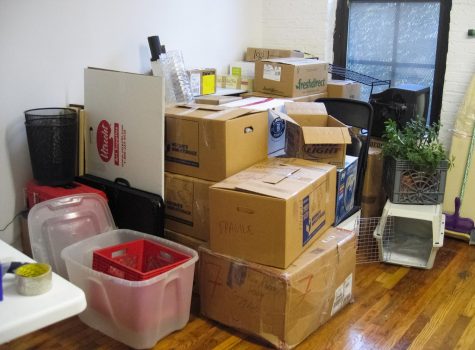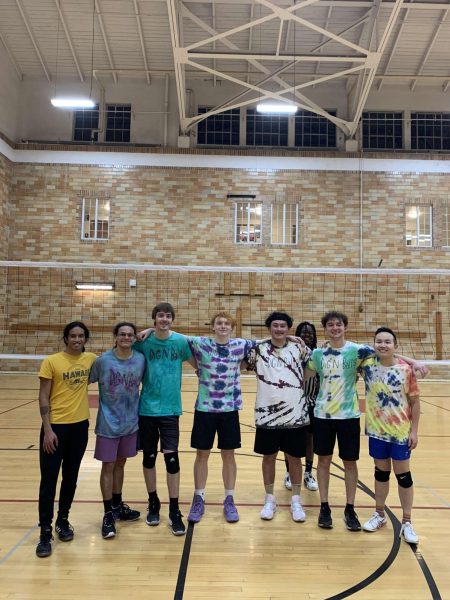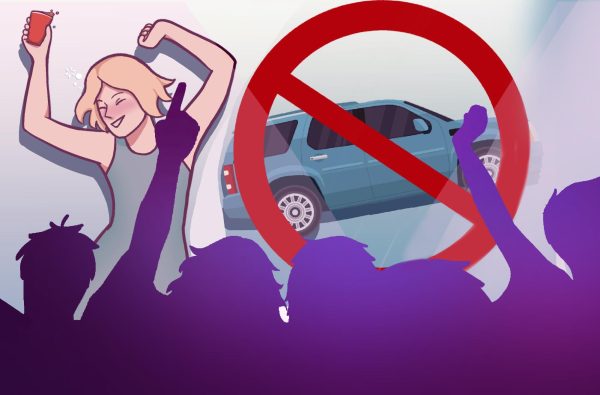It’s a Kanye Christmas
September 16, 2015
Today I’m going to write about how to wear a Christmas sweater to a job interview. Just kidding, I’m not actually going to. How awful would that be? I don’t even know how one would do that.
Instead let’s talk about Kanye, because Kanye is like a Christmas sweater at a job interview. When talking about his daughter he’s warm and comforting like a sweater. His art is often unpredictable, like questions at an interview. And, like a Christmas sweater at a job interview, Yeezus is confusingly religious.
Last week, Kanye West announced his “Yeezy x Adidas Season 2” fashion show would run during New York Fashion Week, during other designers’ time slots that had been reserved months in advance.
I typically only listen to rap if the artist also happens to write for my favorite TV show, or happens to share my hometown. I can’t really comment on Kanye’s music, but his intrusive presence at New York Fashion Week is highly representative of the problems large corporations cause in the fashion world.
I would not be upset about Kanye interrupting New York Fashion Week if he was purposeful about it. If Kanye purposefully overshadowed other designers’ collections just to show how much influence he had, I wouldn’t be mad. If he was deliberately interrupting in order to cultivate a powerhouse, cocksure persona to the public, I wouldn’t care.
At the 2015 VMAs just a few weeks ago, Kanye received the Video Vanguard Award and gave a very heartfelt speech about his role in the music world, fatherhood and future presidency. Kanye is running for president, if you hadn’t heard, but that’s for an entirely different column. While reflecting on how he’d been perceived by the public since the “Imma let you finish” incident, Kanye stood up at the VMAs and said, “The problem was the contradiction; I do fight for artists, but in that fight, I somehow was disrespectful to artists.”
Well, West, you did it again. You can’t say you fight for artists, recognize that you made a mistake and accidentally disrespected artists and then continue to disrespect artists. However well intentioned, Kanye made life incredibly difficult for the relatively smaller designers Anne Bowen and Naeem Khan, whose time slots he occupied.
This is not the first time someone with better resources made it hard for small designers to succeed. Big companies often embody the comforting, unpredictable, and odd religiousness of Kanye in their business practices, to the detriment of small businesses.
Big businesses like Wal-Mart and Nike can be very comforting. You know exactly what to expect when you walk into any one of their stores. Wal-Mart provides comfort through consistently low prices. Nike provides comfort through consistently cool and high-quality products. There’s something about these brands that we gravitate toward. They make us feel warm and fuzzy, almost like a knitted holiday garment intended to cover the torso.
Big companies, like Kanye, are often confusingly religious. There are some businesses with a moral code, not that religion and morality are the same thing. Yet similar to Kanye, there are businesses striving to make a positive impact on the world.
Patagonia has a page on their website titled “The Footprint Chronicles.” It charts where every aspect of the production chain occurs. Eileen Fisher recently announced its Vision 2020 campaign, detailing the first five years of its plan to achieve 100 percent sustainability.
But despite how much they try, big companies cannot eliminate risk. Even Patagonia admits that parts of the production process are harmful to the environment or wasteful. The best they can do is be upfront about it and try their best.
Part of the problem is big companies often get more profit from high quantity, low quality sales and therefore will never produce inside the U.S. because it’s too expensive. This is a problem because corporations often have a Kanye-esque element of unpredictability.
When brands send designs to factories to be produced, they often haggle over price. Companies are trying to appeal to customers in a market where we expect cheaper and cheaper clothing. Factories often have to look for ways to make clothes cheaper, and because of this they sometimes contract out to smaller, less expensive factories. These contracted factories make it harder to regulate safety and labor conditions.
Factories also feel compelled to cut costs because it isn’t unheard of for a brand to return 30 percent of their product, unpaid for, back to the factory. When product doesn’t sell, companies try to send it back to the factories claiming it’s defective. When brands don’t know if they’re going to make sales and factories don’t know if they’re going to be paid, there’s a lot of unpredictability endemic to the production process.
Over the summer I interned at an apparel company called UBI-IND. The owner sourced and contracted every element of his apparel from the U.S. The factory that cut and sewed his jeans was a 10 minute drive from his design studio. Smaller-scale production is just easier to keep track of. Heck, he trusted an intern to do it. This is the only way, as a designer, to know your clothes are being made ethically.
Patagonia and Eileen Fisher are great examples of companies that are trying to be a positive influence in the industry. But if you want to know exactly where your clothes came from, and what your money funds, the best way is to support local designers who source from the U.S.
Yes, small brands tend to be more expensive, but that’s because they’re not using a hut full of children in a third world country to make their clothes. I know big companies are comforting, but we need to take responsibility as consumers and do some research before we buy.
If anyone has an outfit suggestion or concept sketch of how to wear a Christmas sweater to a job interview, please tweet it to us @DailyEvergreen or email us at [email protected], we would love to see them.



















